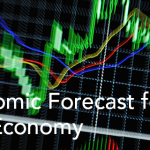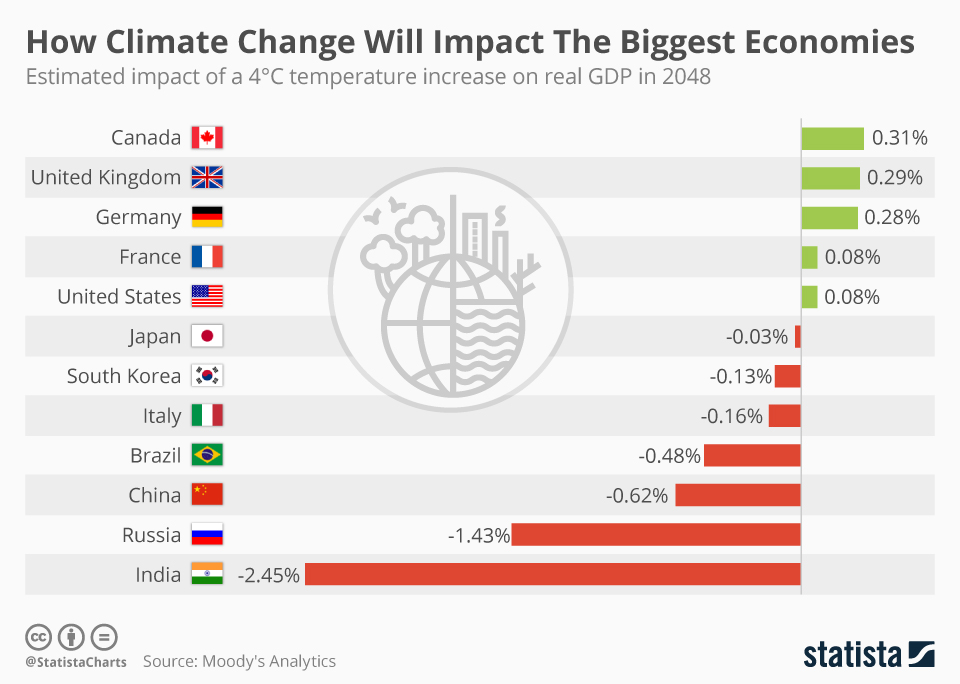The economic impact of climate change is emerging as a critical concern for policymakers and economists alike, with recent studies revealing that the potential costs may far exceed earlier estimates. As global temperatures rise, the repercussions on productivity and economic stability are predicted to be severe, with research indicating that a further increase of just 1°C could lead to a staggering 12% reduction in global GDP. This alarming projection highlights the urgent need for effective decarbonization policies to mitigate these risks and curb the cost of climate change. With extreme weather events becoming more frequent and severe, it is essential to understand the long-term economic implications brought about by these climate change projections. As the world confronts this complex challenge, an integrated approach that addresses the intertwined nature of economic growth and environmental sustainability appears increasingly necessary.
The financial ramifications of climate change are becoming increasingly evident, compelling a re-evaluation of traditional economic models. As temperatures escalate, the anticipated effects on global markets and national economies could be unprecedented, potentially derailing economic progress and exacerbating inequality. New analyses focus on the broader economic toll of rising temperatures, emphasizing the necessity for proactive measures to address these shifts. Mitigation strategies and sustainability efforts must be prioritized to prevent catastrophic GDP impacts and ensure a stable economic future. As we navigate these uncertain waters, understanding the cost implications of climate change is vital for shaping resilient policy frameworks.
Understanding the Economic Impact of Climate Change
The economic impact of climate change is becoming increasingly apparent as new studies reveal projections that underscore its significance. As the world continues to warm, macroeconomic forecasts paint a grim picture, suggesting that every increase of just 1°C in global temperatures can lead to a staggering 12 percent decline in global GDP. This startling statistic not only highlights the direct cost of climate change but also reflects a critical shift in how economists approach climate-related economic forecasts. Contrary to earlier models that estimated relatively modest economic losses, this revised understanding suggests that the repercussions of climate change are far more profound than previously acknowledged.
Moreover, as we consider the implications of these findings, it becomes clear that the economic costs associated with climate change extend beyond immediate GDP declines. The rising temperatures exacerbate extreme weather events, disrupt agricultural output, and threaten productive sectors across the globe. Predicting these economic outcomes accurately requires a comprehensive understanding of both environmental science and economic models, creating a complex yet necessary synergy to better inform decarbonization policies that could mitigate these risks.
Rethinking the Cost of Climate Change
The cost of climate change has historically been underreported, with many economic models failing to account for the broader impacts of rising global temperatures on national economies. New research suggests that the cost may be six times higher than previous estimates, compelling economists to rethink traditional projections. This paradigm shift is essential as countries begin to prepare for future economic landscapes that will inevitably be affected by climate change. When combined with international efforts to decarbonize, understanding these new costs can better shape economic policies that emphasize sustainability.
It’s worth noting that the study conducted by Bilal and Känzig reveals that if global temperatures rise by an additional 2°C, this could potentially halve economic output and consumption. Such findings emphasize that while economic growth may continue, the potential prosperity of future generations will be significantly impaired if decisive climate action isn’t taken. Ensuring robust economic forecasts based on the cost of climate change is crucial for policymakers aiming to design effective interventions that prioritize environmental sustainability and economic resilience.
The Role of Decarbonization Policies
Decarbonization policies are becoming increasingly pivotal in addressing the economic impact of climate change. The recent analysis by Bilal and Känzig indicates that investments in decarbonization not only help reduce greenhouse gas emissions but also offer significant economic returns. Their findings suggest that the cost of federal decarbonization initiatives, such as those covered under the Inflation Reduction Act, is justified when weighed against the prohibitive social cost of carbon—estimated to be $1,056 per ton according to their study. This creates a compelling case for extensive investment in clean energy and sustainable practices.
Implementing ambitious decarbonization policies can help mitigate the far-reaching economic dangers posed by climate change. By aligning economic strategies with environmental sustainability goals, governments can harness technological advancements and innovation in their favor. Since economic output would otherwise be dramatically reduced under continued warming scenarios, adopting policies that promote a greener economy can lead to enhanced productivity, job creation, and improved public health outcomes—addressing both environmental and economic stability.
Climate Change Projections and Their Implications
Climate change projections are crucial for forecasting the economic ramifications of our current trajectory. With the data compiled from weather and economic records over the past 120 years, the projections indicate alarming trends in global warming and their impact on financial stability. Every degree of temperature increase not only jeopardizes environmental systems but also poses significant threats to economic outputs worldwide. The implications are clear: as temperatures continue to rise, nations will face unprecedented economic challenges that necessitate urgent attention and action.
Furthermore, these climate change projections illuminate the multifaceted relationship between rising temperatures and economic performance. They reveal that extreme weather events and natural disasters—exacerbated by climate change—will likely affect productivity and damage capital assets significantly. Understanding these projections allows policymakers to formulate better preparedness plans, invest in climate resiliency, and ensure that economies are equipped to handle the impending economic disruptions caused by climate change.
Global Temperature Increase: A Major Economic Threat
The increase in global temperatures is a pressing concern that directly correlates with economic stability. As noted in recent economic studies, a rise of just 1°C could translate into billions of dollars in losses due to diminished productivity and rising operational costs across various sectors. This reality poses a formidable challenge for policymakers and economic planners who must now account for climate variables in their long-term strategies, underscoring the importance of integrating climate considerations within economic forecasting.
Additionally, the ramifications of such temperature increases extend to international trade dynamics, agricultural yield fluctuations, and public health expenditures. Developing nations, which often bear the brunt of climate impacts without the same coping mechanisms as developed countries, are especially vulnerable to these economic threats. Thus, recognizing the economic dangers posed by rising global temperatures is essential not only for national economies but for global markets as well, fostering a collective approach towards mitigation and adaptation strategies.
The Intersection of Climate Science and Economics
The intersection of climate science and economics reveals a complex landscape where environmental and economic outcomes are deeply intertwined. Research conducted by Bilal and Känzig showcases how economic models must evolve to reflect the realities of a warming planet. By understanding the scientific data that informs climate projections, economists can develop more accurate assessments of potential economic damages. This integration is necessary to capture the full scope of climate change impacts on productivity, output, and ultimately, economic health.
Moreover, this collaboration between climate scientists and economists fosters a new narrative around policy formulation. By articulating the urgent economic risks associated with climate change, stakeholders are better positioned to advocate for critical investments in mitigation strategies. The success of this intersection depends on transparent communication that bridges scientific findings with economic data, enabling a comprehensive response to one of the greatest challenges of our time.
Long-Term Economic Forecasts amidst Climate Change
Long-term economic forecasts are increasingly complex due to the unpredictable nature of climate change. New research suggests that the economic fallout from climate change will not be immediate but will manifest more dramatically over time. As such, economists emphasize the need for dynamic models that take into account evolving climate conditions and their gradual impacts on the economy. These forecasts are vital for guiding budgets, investments, and policies that can mitigate financial crises resulting from climate-related disruptions.
As we look toward the future, it is imperative that economic forecasts consider factors such as technological advancements in renewable energy, shifts in consumer behavior, and international climate agreements. Integrating these elements into long-term projections can better prepare economies to withstand the pressures of climate change. Organizations and governments that leverage these insights will not only navigate the forthcoming challenges more effectively but will also position themselves as leaders in sustainable economic practices.
Mitigating Risks through Climate-Informed Policy Making
Mitigating the economic risks associated with climate change necessitates comprehensive, climate-informed policymaking. Recent studies emphasize that proactive measures, such as stronger decarbonization policies, are key to reducing the anticipated economic burdens. This approach allows governments to align their economic strategies with environmental goals, thereby creating financial frameworks that support long-term sustainability. Implementing such measures can prevent severe disruptions in productivity and foster resilience against climate impacts.
Additionally, creating policies informed by rigorous economic climate models will ensure that investments are strategically targeted towards the most vulnerable sectors. By prioritizing initiatives that encompass both economic growth and environmental conservation, policymakers can pave the way for a sustainable future. Ultimately, fostering collaboration between economists and climate scientists will enhance understanding and drive action, leading to effective solutions that minimize the economic toll of climate change.
The Importance of Accurate Climate Change Metrics
Accurate metrics for assessing climate change impacts are crucial for understanding their economic implications. Recent studies highlight the need for comprehensive data that includes both qualitative and quantitative measures of environmental changes and their economic repercussions. By employing advanced modeling techniques, researchers and economists can project how various climate scenarios will affect different sectors of the economy, leading to more informed decision-making.
Furthermore, having precise climate change metrics enables stakeholders to articulate the costs associated with inaction more effectively. This understanding fosters greater public awareness and political will to implement necessary policies. As the evidence surrounding climate change becomes more undeniable, the importance of accurate metrics grows, making them an essential tool in guiding future economic policies that prioritize sustainability.
Frequently Asked Questions
What is the economic impact of climate change on global GDP?
The economic impact of climate change is substantial, with a recent study indicating that every additional 1°C rise in global temperatures could result in a 12 percent decline in global GDP. This projection highlights the severity of climate change and its significant costs to economies worldwide.
How does rising global temperatures affect the cost of climate change?
Rising global temperatures substantially increase the cost of climate change, which is now projected to be six times larger than previous estimates. Each additional 1°C increases economic losses, demonstrating a direct correlation between temperature rise and economic repercussions.
What are the GDP impacts of climate change according to new projections?
New projections suggest that the GDP impact of climate change is dire, projecting that global GDP could decline significantly due to rising temperatures. Specifically, the analysis indicates that a 2°C increase could lead to a 50 percent reduction in output and consumption, highlighting the severity of climate change’s economic toll.
Why are decarbonization policies critical in mitigating the economic impact of climate change?
Decarbonization policies are essential to mitigate the economic impact of climate change, as evidenced by studies indicating that the social cost of carbon is far greater than projected costs of implementing such policies. The economic benefits of reducing emissions far outweigh the costs, making these policies vital for future economic stability.
How do climate change projections influence economic planning?
Climate change projections significantly influence economic planning by providing insights into the long-term economic impacts related to rising global temperatures. Understanding these projections helps policymakers create more effective strategies to address the potential economic costs associated with climate change, ensuring sustainability and growth.
What is the social cost of carbon in terms of climate change?
The social cost of carbon represents the economic impact of carbon emissions on society. Recent studies estimate the social cost at $1,056 per ton globally, a stark increase compared to previous estimates. This figure emphasizes the financial implications of climate change and the necessity for robust decarbonization efforts.
How does extreme weather influence the economic impact of climate change?
Extreme weather events, which are exacerbated by climate change, have a profound economic impact as they lead to destruction of capital and decreased productivity. The correlation between global temperature rise and increased frequency of these events suggests that the overall cost of climate change encompasses much more than temperature-related economic outputs.
| Key Points |
|---|
| Rethink of climate change economic projections revealing a 12% drop in GDP for every 1°C rise in temperature, indicating a larger economic impact than previous studies. |
| The analysis predicts that a 2°C rise could lead to a 50% reduction in output and consumption, with long-term consequences exceeding those of the Great Depression. |
| Incorporating global temperature rather than local weather variations enhances predictions of extreme weather effects, which directly correlate with economic productivity losses. |
| New estimates calculate the social cost of carbon at $1,056 per ton, compared to previously lower estimates, reinforcing the need for effective decarbonization policies. |
| Decarbonization policies are shown to be economically beneficial for large economies like the U.S. and the EU, passing cost-benefit analyses. |
Summary
The economic impact of climate change presents serious challenges that cannot be ignored. Recent studies indicate that the rising global temperatures are projected to have a staggering economic toll, with estimates showing that even small increases in temperature can lead to significant reductions in global GDP. The findings highlight the urgency for adequate decarbonization measures. The considerable social cost of carbon further emphasizes the importance of transitioning towards sustainable practices to mitigate these economic losses. As the implications of climate change continue to unfold, prioritizing economic policies that address these effects is crucial for future prosperity.







